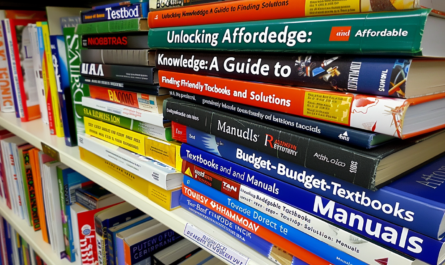Unlocking Affordable Knowledge: Your Guide to Scoring Budget-Friendly Textbooks
As a student, one of the biggest expenses you’ll encounter is purchasing textbooks. The cost of textbooks has skyrocketed in recent years, leaving many students struggling to afford the materials they need for their classes. However, there are several strategies you can employ to score budget-friendly textbooks and unlock affordable knowledge. In this guide, we will explore some of the best ways to save money on textbooks without compromising your education.
1. Start Early and Plan Ahead:
One of the most effective ways to save money on textbooks is to start your search early. As soon as you receive your course syllabus, take note of the required textbooks and begin researching their prices. By planning ahead, you can explore various options and compare prices to find the best deals.
2. Consider Used Textbooks:
Used textbooks are a great way to save money without sacrificing the quality of your education. Many college bookstores offer used textbooks at a significantly lower price than new ones. Additionally, you can check online marketplaces, such as Amazon or eBay, for used textbooks. Just make sure to check the condition of the book before purchasing to ensure it is in good shape.
3. Rent Textbooks:
Renting textbooks is another cost-effective option. Many online platforms, such as Chegg or CampusBookRentals, allow students to rent textbooks for a fraction of the cost of buying them. Renting is especially beneficial for courses that do not require extensive note-taking or for subjects that are not part of your major.
4. Explore Digital Alternatives:
Digital textbooks, also known as e-books, have gained popularity among students due to their affordability and convenience. Many publishers now offer digital versions of their textbooks, which can be accessed on laptops, tablets, or e-readers. Digital textbooks are often cheaper than their physical counterparts and can be easily searched, annotated, and highlighted.
5. Utilize Library Resources:
Your college or local library can be a treasure trove of resources, including textbooks. Many libraries have copies of textbooks available for loan, allowing you to borrow them for the duration of the semester. While you may not be able to keep the book indefinitely, this option can save you a significant amount of money.
6. Join Online Communities:
Online communities, such as textbook exchange groups or forums, can be a valuable resource for finding affordable textbooks. These communities often connect students who are looking to sell or exchange their textbooks with those in need. By joining these groups, you can find textbooks at discounted prices or even trade your old textbooks for the ones you need.
7. Share with Classmates:
Consider sharing textbooks with classmates who are taking the same course. This strategy allows you to split the cost of the textbook, making it more affordable for everyone involved. Coordinate with your classmates to create a schedule that ensures everyone has access to the textbook when needed.
8. Look for International Editions:
International editions of textbooks are often significantly cheaper than their domestic counterparts. While the content may be slightly different, the core concepts remain the same. However, be cautious when purchasing international editions, as some may be unauthorized copies. Always ensure that the edition you are purchasing is legitimate and authorized by the publisher.
9. Seek Financial Aid or Scholarships:
If you are facing financial hardship, consider exploring financial aid options or scholarships specifically designated for purchasing textbooks. Many universities and organizations offer assistance programs to help students cover the cost of educational materials. Reach out to your college’s financial aid office or search online for available resources.
By implementing these strategies, you can unlock affordable knowledge and save a substantial amount of money on textbooks. Remember to start early, explore different options, and take advantage of resources available to you. With a little effort and planning, you can successfully navigate the textbook market without breaking the bank.


